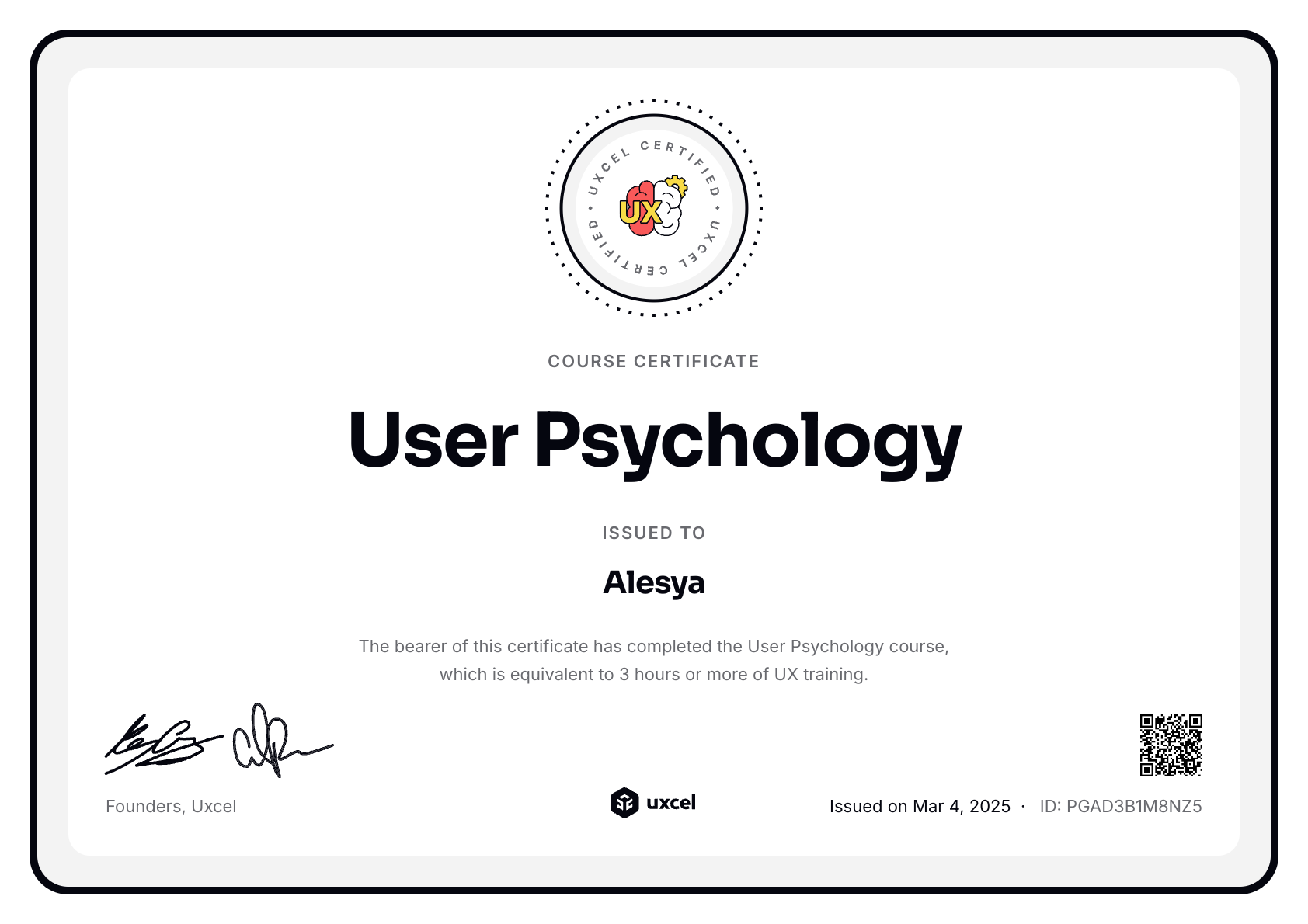User Psychology
Learn the psychological principles behind user behavior and decision-making. Master core concepts in user psychology to help you design more engaging products.
About this course
Understanding user psychology can transform the way you approach product design and development. You don’t need a psychology degree to see that human behavior follows predictable patterns. Many psychological studies reveal valuable insights that can be applied to creating better user experiences. Take the famous "Gorilla Experiment," for instance: viewers watching a video of students passing a basketball often fail to notice a person in a gorilla suit. This demonstrates how people can miss obvious details when focused on a task—emphasizing the importance of clear, intuitive design that guides users’ attention where it matters most.
In Uxcel's User Psychology course, we’ll show you how understanding psychology can drive better product outcomes. We’ll explore why a single negative experience can turn users away and how to avoid cognitive biases that influence decision-making. You’ll discover why the number of menu options isn’t always seven and what Miller’s Law really tells us about human memory.
The course delves into three key psychological needs that fuel user engagement, plus why understanding user memory is essential for creating frictionless experiences. You’ll also gain insights into building trust through strategies like free trials and why deceptive patterns can undermine your product.
Lastly, we'll cover how seemingly small details—like progress trackers or positive reinforcement messages—can significantly boost user satisfaction and retention. This course provides a comprehensive guide to creating user-centered designs that are informed by psychological principles, helping you craft products that resonate with your audience.
Details
Prerequisites
Skills you’ll gain with course:
Topics covered
Syllabus
Common Laws of the Human Brain




Level Test
Human Memory & Mental Models





Level Test
Human Perception & Trust





Level Test
Earn a certificate of completion

Meet your course instructor

Currently the Edu Lead at Uxcel.
I develop and maintain Uxcel’s content strategy, making sure it aligns with our overall goals as an educational platform. I create high-quality content that follows our brand guidelines — this includes researching, writing, editing, and proofreading lessons, tutorials, blog posts, social media content, and other UX design materials.
I manage a team of content writers and designers, helping them meet deadlines, providing feedback, and supporting their skill development. I also work closely with developers and marketers to keep our content aligned with Uxcel’s broader strategy.
Staying up-to-date with industry trends, new technologies, and UX design best practices is a big part of what I do to keep our content fresh and relevant.
Dog lover, yoga enthusiast, and dancer.
Loved by learners from world’s top companies












Related courses

UX Design Foundations

UX Research

Color Psychology
FAQs
Uxcel's UX Design Psychology course explores the intersection of psychology and design. It covers essential topics such as understanding user behavior, cognitive biases, memory principles, and how these psychological insights can be applied to create intuitive, engaging, and user-friendly interfaces. You'll learn strategies to build user trust, avoid common design pitfalls, and enhance overall user experience.
Without understanding psychology, designers can still create interfaces, but there's a high risk they won't meet users' needs, leading to frustration and abandonment. Designers can't assume they know everything or claim to be users themselves, as their experiences and biases differ.
Understanding psychology helps designers create interfaces that truly work for users. It allows them to anticipate needs, reduce friction, and design more intuitive experiences. This not only boosts user satisfaction, engagement, and trust but also helps businesses save money by avoiding costly redesigns and improving user retention. Knowing what makes users tick ensures your designs hit the mark and keeps them coming back.
This course will deepen your understanding of user psychology, teaching you about common patterns of user behavior, how memory works, and what influences users' trust. With this knowledge, you'll be better equipped to create more effective and user-centered designs, improve usability, and build stronger user relationships. By applying these psychological principles to your future projects, you'll be able to design more intuitive and engaging user experiences that truly meet users' needs and expectations.






